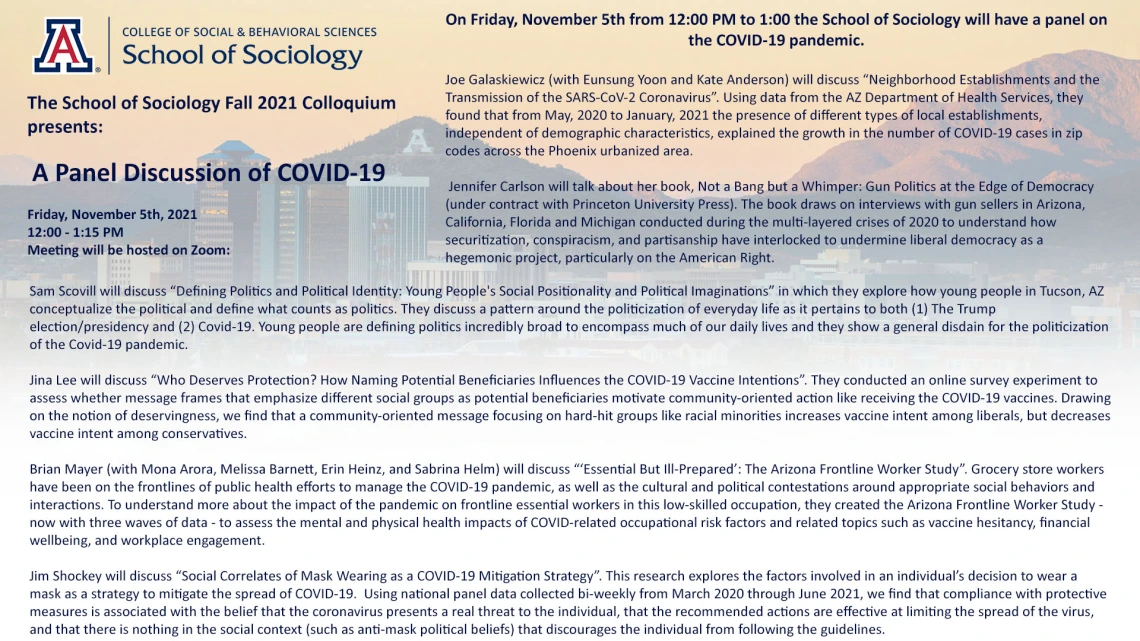
When
The UA School of Sociology is holding a Brownbag COVID-19 Panel discussion on Friday, November 5th, 2021.
The Sociology Brownbag will be held online via Zoom at the link below from 12:00-1:15PM:
Zoom link: https://arizona.zoom.us/j/83796462919
Zoom password: weber
Please find Speaker Titles and abstracts for this panel below:
Joe Galaskiewicz (with Eunsung Yoon and Kate Anderson) will discuss “Neighborhood Establishments and the Transmission of the SARS-CoV-2 Coronavirus”. Using data from the AZ Department of Health Services, they found that from May, 2020 to January, 2021 the presence of different types of local establishments, independent of demographic characteristics, explained the growth in the number of COVID-19 cases in zip codes across the Phoenix urbanized area.
Jennifer Carlson will talk about her book, Not a Bang but a Whimper: Gun Politics at the Edge of Democracy (under contract with Princeton University Press). The book draws on interviews with gun sellers in Arizona, California, Florida and Michigan conducted during the multi-layered crises of 2020 to understand how securitization, conspiracism, and partisanship have interlocked to undermine liberal democracy as a hegemonic project, particularly on the American Right.
Sam Scovill will discuss “Defining Politics and Political Identity: Young People's Social Positionality and Political Imaginations” in which they explore how young people in Tucson, AZ conceptualize the political and define what counts as politics. They discuss a pattern around the politicization of everyday life as it pertains to both (1) The Trump election/presidency and (2) Covid-19. Young people are defining politics incredibly broad to encompass much of our daily lives and they show a general disdain for the politicization of the Covid-19 pandemic.
Jina Lee will discuss “Who Deserves Protection? How Naming Potential Beneficiaries Influences the COVID-19 Vaccine Intentions”. They conducted an online survey experiment to assess whether message frames that emphasize different social groups as potential beneficiaries motivate community-oriented action like receiving the COVID-19 vaccines. Drawing on the notion of deservingness, we find that a community-oriented message focusing on hard-hit groups like racial minorities increases vaccine intent among liberals, but decreases vaccine intent among conservatives.
Brian Mayer (with Mona Arora, Melissa Barnett, Erin Heinz, and Sabrina Helm) will discuss “‘Essential But Ill-Prepared’: The Arizona Frontline Worker Study”. Grocery store workers have been on the frontlines of public health efforts to manage the COVID-19 pandemic, as well as the cultural and political contestations around appropriate social behaviors and interactions. To understand more about the impact of the pandemic on frontline essential workers in this low-skilled occupation, they created the Arizona Frontline Worker Study - now with three waves of data - to assess the mental and physical health impacts of COVID-related occupational risk factors and related topics such as vaccine hesitancy, financial wellbeing, and workplace engagement.
Jim Shockey will discuss “Social Correlates of Mask Wearing as a COVID-19 Mitigation Strategy”. This research explores the factors involved in an individual’s decision to wear a mask as a strategy to mitigate the spread of COVID-19. Using national panel data collected bi-weekly from March 2020 through June 2021, we find that compliance with protective measures is associated with the belief that the coronavirus presents a real threat to the individual, that the recommended actions are effective at limiting the spread of the virus, and that there is nothing in the social context (such as anti-mask political beliefs) that discourages the individual from following the guidelines.

